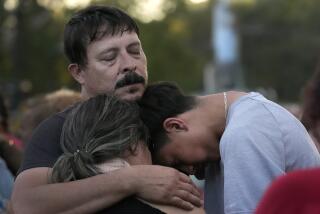Race friction still roils Texas town
- Share via
HOUSTON — Only a few weeks ago, race relations had reached such a low point in the troubled East Texas town of Paris that federal Justice Department mediators were called in to try to bring together black and white citizens, but the public meeting quickly dissolved into rancor.
Now, fresh tensions are erupting at one of the town’s biggest employers, the Turner Industries pipe fabrication plant, where black workers say nooses, Confederate flags and racist graffiti have been appearing throughout the workplace for months.
One worker, Karl Mitchell, took pictures of the offensive symbols in early February and filed a formal complaint with the federal Equal Employment Opportunity Commission last week. Other African American employees assert that they’ve repeatedly complained about the racist symbols to their bosses, only to be ignored or told to keep quiet.
“Somebody had to step forward,” said Mitchell, who also alleges a pattern of wage and promotion discrimination at the plant stretching back nearly two years.
Officials at Turner Industries headquarters in Baton Rouge, La., say they learned of the allegations only last week, when photographs of the symbols began circulating on the Internet. They say a noose and other inflammatory items have been removed and an investigation has been launched.
“All of us in management find all of that offensive,” said John Fenner, the company’s corporate general counsel. “We do not condone any displays of this type. I can promise you that in the event we uncover that any of our people participated in the display of any of those matters, they may very well lose their jobs.”
Fenner also denied that blacks, who account for 11% of the plant’s 660 employees, are discriminated against in either pay or promotions.
The flare-up at Turner Industries comes as Paris leaders were hoping to finally fall out of the spotlight after several troubling racial incidents.
Paris drew national scrutiny in 2007 after a 14-year-old African American girl, Shaquanda Cotton, was sentenced by a judge to up to seven years in a youth prison for shoving a hall monitor at Paris High School. Three months earlier, the same judge had sentenced a 14-year-old white girl to probation for the more serious crime of arson. Less than a month after a Chicago Tribune story contrasting the two cases triggered national protests and petition drives, Texas authorities ordered Shaquanda’s early release from prison.
Then last year, a black man, Brandon McClelland, 24, was killed, allegedly by two white men who authorities charge dragged him beneath a pickup truck until his body was nearly dismembered. The suspects are awaiting trial on murder charges, but McClelland’s family and civil rights leaders have pressed to add hate-crime charges.
--
More to Read
Sign up for Essential California
The most important California stories and recommendations in your inbox every morning.
You may occasionally receive promotional content from the Los Angeles Times.










